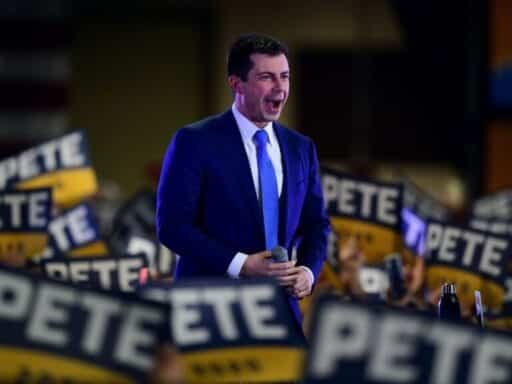Weeks after the Iowa caucuses debacle, the Buttigieg campaign is questioning Nevada’s math.
Shortly after conceding the Nevada caucuses to Sen. Bernie Sanders, former South Bend Mayor Pete Buttigieg began questioning the results there.
Late Saturday night, a letter from Buttigieg’s campaign to the chairman of the Nevada State Democratic Party made clear that the campaign has questions about what it says are “irregularities” in the results, the Nevada Independent reported.
In the letter, Buttigieg’s campaign requests all early vote and in-person vote totals be released by precinct, along with explanations for any “anomalies in the data.”
New: Pete Buttigieg’s campaign is alleging “irregularities and a number of unresolved questions” against the Nevada State Democratic Party.
The complaints center on how early voting totals were folded into caucus day totals & claim “anomalies in the data.”
Here is the letter: pic.twitter.com/HYlvHqsr4n
— Dan Merica (@merica) February 23, 2020
Before vote totals were in on Saturday, Sanders’ win was clear, and as of Sunday evening, with about 60 percent of precincts reporting, the senator has some 46 percent of the vote. As of Sunday evening, Biden appears to be in a distant second place, and Buttigieg shoring up third place.
In the letter to the state party, his campaign argues those results may need revision and that the “process of integrating early votes into the results of the in-person precinct caucuses … was plagued with errors and inconsistencies.”
The caucuses were held over an extended period this year, and featured four days of early caucusing in the form of ranked choice voting. The totals from those early caucus forms were added to both first and second round in-person caucuses on Saturday.
Although not rife with problems like the Iowa caucus, it is true there were some hiccups in Nevada. Some precincts reporting difficulty sharing their results with party officials, and some caucus-goers did note some confusion on rules at their precincts.
But these issues did not prevent a winner from being announced, and in general did not seem abnormal, particularly given the caucuses process is often messy, featuring as it does multiple rounds of people moving around rooms as they try to convince others to support a given candidate. And the process can lead to some less-than-democratic means of determining who will win, such as drawing from a deck of cards to break a tie.
According to the Buttigieg campaign, the inherent complexity of the caucuses process that caused several problems in Nevada. According to its letter, early vote counts were not always used when determining the viability of a candidate in the first round. The campaign also said that in some precincts, precinct chairs said that a non-viable candidate from the first round could not become viable in the second — essentially, that caucus-goers were not allowed, as they should have been, to try to convince others to support a candidate in order to bring them to viability.
Party officials in Nevada have not yet signaled whether any review will take place.
“We are continuing to verify and to report results,” a spokesperson for the Nevada State Democratic Party told The Hill. “We never indicated we would release a separate breakdown of early vote and in-person attendees by precinct and will not change our reporting process now.”
Buttigieg can’t win Nevada, but revised results could help counter a criticism of his campaign
As is the case with the results review currently being conducted in Iowa, a review of the Nevada results won’t change the caucuses’ outcome. Sanders currently has a roughly 30 percentage point lead on Buttigieg, and Biden is about four percentage points ahead.
And even if Buttigieg were to move into second place, it is not clear how much he would benefit as far as the national delegate count is concerned. Based on the results thus far, Sanders is expected to receive 13 national delegates to Biden’s two. Picking up two delegates would do little to close Sanders’s current lead on Buttigieg (who is currently second in the national delegate count) — at the moment, Sanders has 34 to Buttigieg’s 23 delegates.
Buttigieg coming in second, however, could help alter the narrative that has emerged around the results. The candidate has struggled to appeal to voters of color, while Biden — the ostensible second-place finisher in Nevada — counts on his appeal among African American voters in particular.
And his showing in Nevada seemed to provide further evidence that Buttigieg cannot rely on the support of nonwhite voters. But if Buttigieg can prove that he actually did better in Nevada than it currently appears, he would be able to make the case that he can compete even in states where nonwhite voters make up a significant portion of the electorate, something that — with a slate of diverse contests fast approaching — would be an asset to his campaign.
Author: Anya van Wagtendonk
Read More



